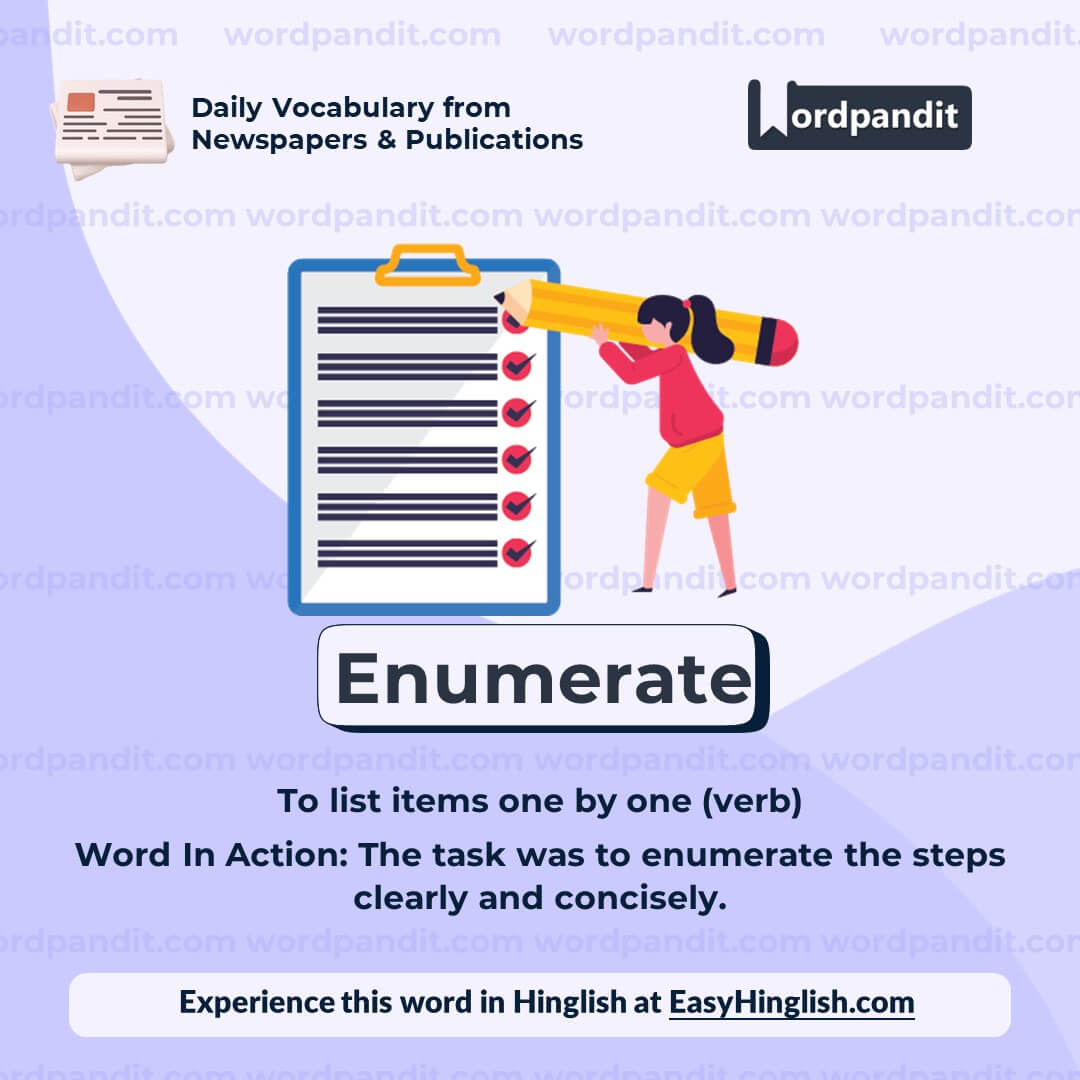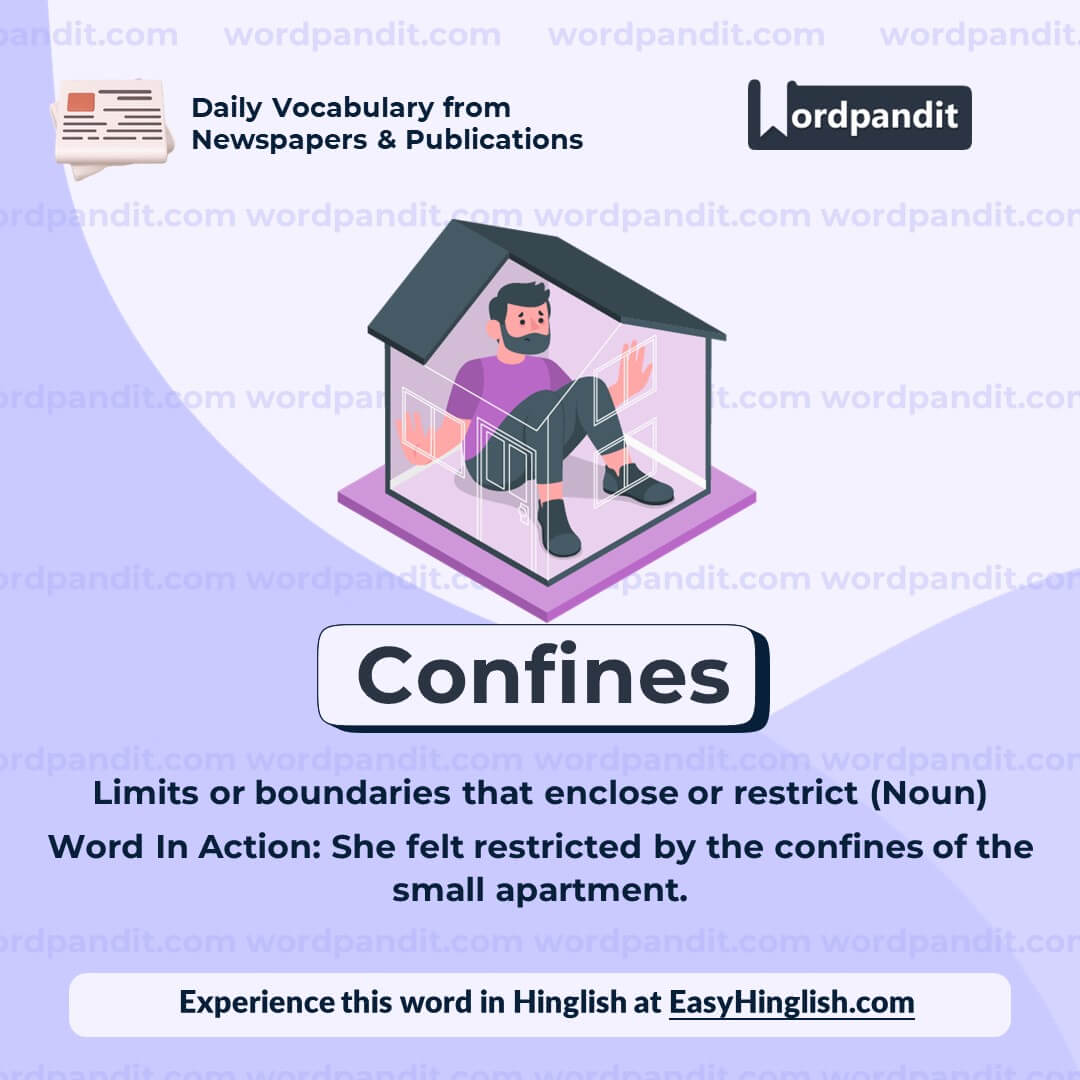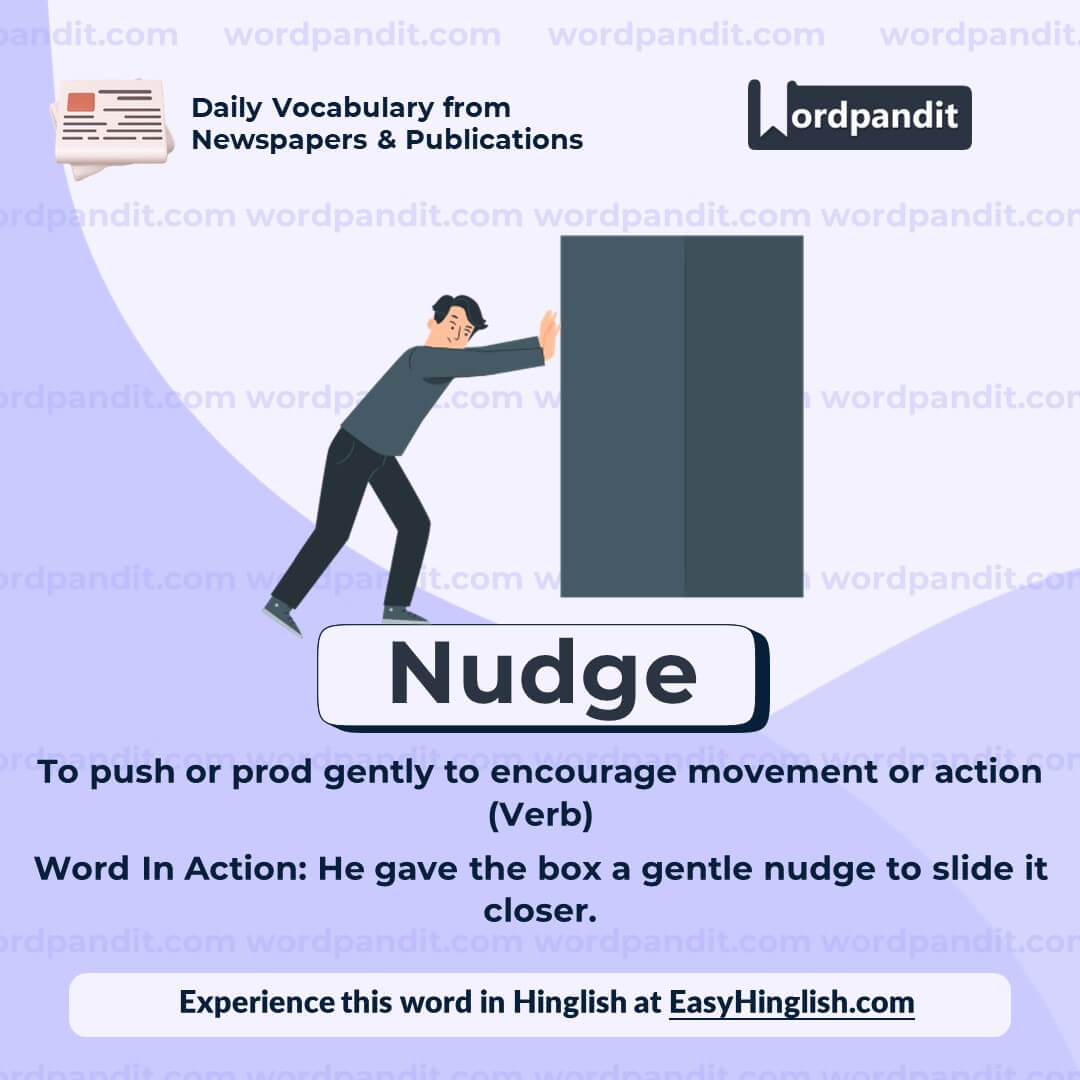Daily Vocabulary from International Newspapers and Publications
Expand Your Vocabulary with Wordpandit’s Global Vocabulary Hub
At Wordpandit, we are committed to helping you develop a truly global vocabulary by drawing from some of the most respected international publications. This section is designed to keep you ahead of the curve by introducing you to words that define global conversations and trends.
The Power of Global Sources
To help you think and communicate on a global scale, we curate vocabulary from renowned international sources, such as:
- The New York Times
- The Washington Post
- BBC
- The Guardian
- The Economist
- Scientific American
- Psychology Today
- And many more...
Stay Global, Stay Competitive
Our daily updates from international publications ensure you are consistently exposed to new words that reflect global news and developments, making sure your vocabulary is not only current but also globally relevant.
Enhance Your Global Perspective
Whether you’re preparing for international exams, aiming to excel in global business communication, or want to enhance your language skills for personal growth, Wordpandit offers the resources you need to thrive in a global context.
Effective Learning, Global Reach
Our learning methodology combines global examples, memory aids, and interactive activities, allowing you to internalize new words effectively and apply them in real-world scenarios.
Begin Your Global Vocabulary Journey Now!
Why Choose Wordpandit?
Practical Learning: Focus on words you'll actually encounter in real-world reading, enhancing your comprehension and communication skills.
Diverse Content: From current affairs to scientific breakthroughs, our varied sources expose you to vocabulary across multiple domains.
Effortless Integration: Make Wordpandit a part of your daily routine. Just a few minutes each day can significantly boost your lexicon over time.
Your Path to Vocabulary Mastery
- Visit our Daily Vocabulary section regularly
- Explore new words and their usage in context
- Practice incorporating these words into your own writing and speech
- Track your progress as your vocabulary expands
Start Your Journey Today
Embark on your vocabulary enhancement journey with Wordpandit. By consistently engaging with our daily posts, you'll build a robust vocabulary that serves you well in academic, professional, and personal contexts.
Remember, a word a day keeps linguistic limitations at bay. Make Wordpandit your daily companion in the quest for vocabulary excellence!
WORD-1: Enumerate
Context:
"That has never stopped people from trying. Scientists still enumerate a method that has anywhere from three to a dozen steps. Some philosophers generalise experiments further as ‘interventions’:" - Aeon
Explanatory Paragraph:
To enumerate means to list items or ideas one by one, often in a detailed and organized manner. It is a word frequently used in academic, scientific, and philosophical contexts where precise articulation of steps, components, or arguments is necessary.
Meaning: To list items one by one (verb)
Pronunciation: eh-NOO-muh-rayt
Difficulty Level: ⭐⭐ Intermediate
Etymology: From Latin enumeratus, past participle of enumerare, meaning "to count out or number," from e- (out) + numerare (to number).
Synonyms & Antonyms:
Synonyms: List, itemize, specify, detail
Antonyms: Generalize, summarize, omit
Usage Examples:
- The teacher asked the students to enumerate the key events in the historical timeline.
- In her speech, she carefully enumerated the challenges the team had overcome.
- The scientist enumerated the steps involved in the experiment to ensure accuracy.
- During the meeting, he enumerated the benefits of adopting the new policy.
Cultural Reference:
"Enumerating principles has been a part of philosophical discourse since ancient Greece, where thinkers like Aristotle listed virtues and logical methods to provide clarity in argumentation." - History of Philosophy Texts
Think About It:
Why do you think enumeration is an effective way of conveying ideas in academic and professional settings?
Quick Activity:
Enumerate three benefits of learning a new language and share them with a friend or colleague.
Memory Tip:
Think of the word "number" inside "enumerate" to remember that it involves listing or counting things out.
Real-World Application:
In project management, enumeration is used to create a list of tasks or goals to be accomplished, ensuring every step is accounted for and completed systematically.
WORD-2: Witness
Context:
"At two degrees above absolute zero, we witnessed helium molecules abruptly huddle into a quantum whole greater than its parts." - Aeon
Explanatory Paragraph:
The word "witness" means to observe or experience an event, usually something significant, firsthand. It can also refer to someone who provides testimony based on what they have seen or experienced. In the context provided, it describes observing a remarkable scientific phenomenon as it occurs.
Meaning: To see, observe, or experience an event or phenomenon (verb); a person who observes an event, especially as a testimony (noun).
Pronunciation: WIT-ness
Difficulty Level: ⭐⭐ Beginner
Etymology: Originates from Old English "witnes," meaning testimony or knowledge, related to "wit," meaning to know or perceive.
Synonyms & Antonyms:
Synonyms: Observe, see, experience, perceive
Antonyms: Miss, ignore, overlook, disregard
Usage Examples:
- We were fortunate to witness the sunrise from the mountain peak.
- The courtroom was silent as the key witness began their testimony.
- The world witnessed a historic moment during the moon landing.
- As we entered the museum, we witnessed artists creating masterpieces in real-time.
Cultural Reference:
The film "Witness" (1985), directed by Peter Weir, explores the experiences of a boy who witnesses a murder and the impact it has on his life and community.
Think About It:
How does being a witness to an event shape your understanding and perspective compared to hearing about it secondhand?
Quick Activity:
Recall an event you witnessed recently. Write a short paragraph describing the event, focusing on what made it memorable.
Memory Tip:
Link "witness" with "wit"—when you witness something, your "wit" or awareness records it as a memory.
Real-World Application:
In science, the word "witness" is often used to describe firsthand observation of experiments or phenomena. Similarly, in everyday life, it plays a crucial role in legal systems, eyewitness accounts, and personal experiences.
WORD-3: Abruptly
Context:
"At two degrees above absolute zero, we witnessed helium molecules abruptly huddle into a quantum whole greater than its parts." - Aeon
Explanatory Paragraph:
"Abruptly" refers to something happening suddenly and without warning, often in a manner that is unexpected or disconcerting. In the given context, it describes the helium molecules forming a quantum whole in a rapid and unforeseen manner.
Meaning: Suddenly and unexpectedly (adverb).
Pronunciation: uh-BRUPT-lee
Difficulty Level: ⭐⭐ Beginner
Etymology: Derived from the Latin word "abruptus," meaning "broken off" or "steep," from "ab-" (off) and "rumpere" (to break).
Synonyms & Antonyms:
Synonyms: Suddenly, unexpectedly, sharply, precipitously
Antonyms: Gradually, slowly, predictably, smoothly
Usage Examples:
- The train came to a halt abruptly, startling the passengers.
- She turned around abruptly, clearly upset by his comment.
- The conversation ended abruptly when the fire alarm rang.
- The weather changed abruptly, going from sunny skies to heavy rain within minutes.
Cultural Reference:
In literature, abrupt changes in plot or tone are often used to surprise readers, such as in Edgar Allan Poe’s works, where unexpected twists heighten suspense.
Think About It:
Why do sudden and abrupt changes often evoke strong reactions or feelings of discomfort in people?
Quick Activity:
Write a sentence describing an event that happens abruptly, such as a surprise encounter or a sudden change in plans.
Memory Tip:
Think of "abruptly" as a quick "break" in the flow of events—imagine something breaking off suddenly to recall its meaning.
Real-World Application:
"Abruptly" is commonly used in scientific descriptions, narratives, and everyday conversations to describe rapid, unexpected changes. Understanding its use can help clarify transitions and emphasize key moments.
WORD-4: Confines
Context:
"This placid superfluid then transitioned into a fountain as the molecules charged from their confines, moved as if by collective will." - Aeon
Explanatory Paragraph:
The word "confines" refers to the boundaries or limits that enclose something, either physically or metaphorically. In the context, it describes a situation where molecules were initially restricted within certain limits before breaking free.
Meaning: Limits or boundaries that enclose or restrict (Noun).
Pronunciation: KON-fynz
Difficulty Level: ⭐⭐⭐ Intermediate
Etymology: Derived from the Latin word "confinis," meaning "bordering upon," combining "com-" (together) and "finis" (end, limit).
Synonyms & Antonyms:
Synonyms: Boundaries, limits, restrictions, constraints
Antonyms: Freedom, openness, expanse, liberty
Usage Examples:
- The artist broke free from the confines of traditional painting styles to create something entirely new.
- Within the confines of the small cabin, the hikers found shelter from the storm.
- The prisoner dreamed of escaping the confines of his cell.
- The debate transcended the usual confines of academic discourse, reaching a wider audience.
Cultural Reference:
"In the play *Hamlet*, Shakespeare uses the phrase 'confines of a nutshell' to illustrate how a person can feel mentally trapped even within a small, physical space." - William Shakespeare
Think About It:
How do societal confines shape individual freedom, and when is it appropriate to challenge them?
Quick Activity:
Write a sentence using "confines" to describe a limitation you've recently encountered and how you overcame it.
Memory Tip:
Think of "confines" as "confining lines" that enclose or limit something. Visualize being in a box with boundaries to remember the meaning.
Real-World Application:
"Confines" is commonly used in discussions about physical spaces (like rooms or borders), social rules, or mental limitations, making it applicable in areas like architecture, psychology, and sociology.
WORD-5: Nudge
Context:
"We nudged these particles into resonance, using a radio wave tuned to their spins, as one might excite children to twirl in unison with a song." - Aeon
Explanatory Paragraph:
The word "nudge" means to gently push or prod something or someone to initiate movement or action. It is often used both literally, as in physically pushing, and metaphorically, as in subtly encouraging or influencing someone toward a decision or behavior.
Meaning: To push or prod gently to encourage movement or action (Verb).
Pronunciation: NUHJ
Difficulty Level: ⭐⭐ Beginner
Etymology: Originates from the late 17th century, possibly of Scandinavian origin, related to the Norwegian "nugga," meaning to push or rub.
Synonyms & Antonyms:
Synonyms: Push, prod, prompt, encourage, urge
Antonyms: Discourage, pull, deter, restrain
Usage Examples:
- The teacher gave the student a gentle nudge to speak up during the discussion.
- She nudged her friend to remind him of their appointment.
- The marketing campaign nudged customers toward eco-friendly products.
- He nudged the door open with his foot, carrying the heavy box inside.
Cultural Reference:
In their book *Nudge: Improving Decisions About Health, Wealth, and Happiness*, Richard H. Thaler and Cass R. Sunstein popularized the concept of "nudging" in behavioral economics, emphasizing small interventions to steer people toward better choices without restricting their freedom.
Think About It:
How can small "nudges" influence large-scale changes in individual behavior or society?
Quick Activity:
Think of a situation where you needed a "nudge" to accomplish something. Write a sentence about it and how it helped you take action.
Memory Tip:
Picture gently tapping someone on the shoulder to get their attention—that’s a "nudge." It’s subtle but effective, just like the word itself.
Real-World Application:
"Nudge" is often used in fields like behavioral economics, education, and advertising to describe small, strategic actions that influence decisions without force.


















